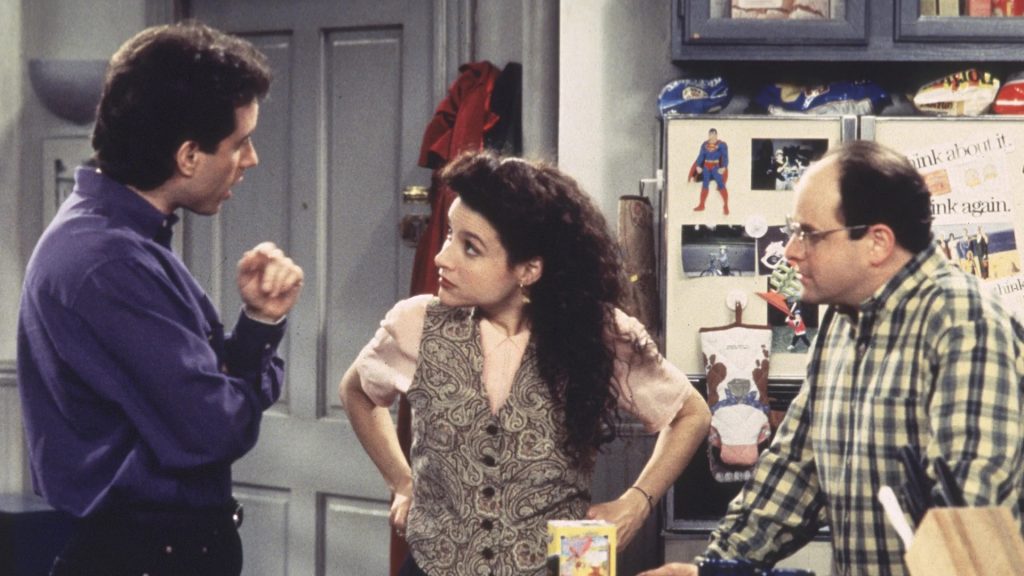By Martin Keady · June 5, 2024

The golden age of TV is usually acknowledged as starting with The Sopranos (1999-2007) and ending with Mad Men (2007-2015), a period that encompasses the full run of probably the greatest TV series of them all, The Wire (2002-2008). Collectively, those three shows constitute what I have previously called The Holy Trinity of TV.
For all the obvious merits of Breaking Bad (2008-2013) and Succession (2018-2023) in particular, there has never been a TV series since then to match their brilliant writing, extraordinary acting, and sheer Shakespearean scale and intensity. However, despite having episodes of deliciously dark comedy (and none were ever darker or funnier than “Pine Barrens,” arguably the greatest single episode of The Sopranos), The Holy Trinity of TV were all dramas.
Consequently, it is possible to argue that there was an earlier golden age of TV, roughly encompassing the last three decades of the 20th century and the start of the 21st century, that contained all the greatest TV comedies, especially the greatest sitcoms (or situation comedies).
If the coming of cable or subscription television at the end of the 20th century liberated TV dramas like The Sopranos, The Wire, and Mad Men to address subjects that network television had previously largely considered taboo, such as the inner workings of a crime family (in The Sopranos) or the apparent similarities between police and criminals (as in The Wire), arguably the reverse was true of comedy.
Although they operated within the restrictions of large-scale, necessarily commercially driven network television, the greatest sitcoms of this period nevertheless created sublime comedy that completely transcended social, cultural, and even national differences. Barry Manilow may have claimed to “write the songs that make the whole world sing,” but the greatest TV comedies truly told the jokes that made the whole world laugh. They continue to do so by airing in seemingly endless syndication or repeats, to the extent that, for example, estimates suggest that at any point in time, a Seinfeld (1989-1998) episode is airing somewhere in the world.

‘Seinfeld’
There have been great comedies since these shows, most spectacularly Curb Your Enthusiasm (2000-2024)—the great off-shoot from Seinfeld that has run throughout most of the 21st century. It only recently came to a seemingly natural end with its much-vaunted finale and, perhaps even more crucially, due to the death of Richard Lewis, its beloved co-star and best friend of Larry David, the show’s creator. However, even the most devoted Curb-head would struggle to argue that it attained anything like the truly global reach and popularity of Seinfeld or any of the other great sitcoms of the golden age of TV comedy.
Like almost all golden ages, it is only in retrospect that its goldenness becomes truly apparent. Nearly 20 years later, the golden age of US sitcoms (and despite the genius of the finest Britcoms such as Fawlty Towers (1975-1979) or Peep Show (2003-2015), they could not match the near-industrial size and scale of the greatest US sitcoms) can truly be appreciated.
At its finest, it was a veritable Empire of Mirth, indeed almost an antidote to the other excesses of American cultural imperialism that have been so problematic, to say the least, in recent decades.
And I will make one final point before I identify what in my humorous opinion are the greatest shows of the golden age of US sitcoms. There were many great shows, from Taxi (1978-1983) to The Larry Sanders Show (1992-1998) to Friends (1994-2004), but even they could not match the most fabulous and funniest five.
I still vividly remember the first time I saw the film M*A*S*H, Robert Altman’s dark and bloody masterpiece about a US mobile army surgical hospital during the Korean War (or “Police Action,” as the US called it at the time, which may be the darkest joke about the conflict). It was so completely, indeed antithetically, different from the light, bright, and often hilarious TV show of the same name that I could not understand how they shared a title. At the time, I was only a child or young teen, so I did not realize that the TV series was the most head-spinning of spin-offs from the film and bore little or no resemblance to it.
The M*A*S*H world, which began with Richard Hooker’s semi-autobiographical novels about his own experience as an army doctor in Korea in the 1950s, is a large one, and, in time, I realized that it could encompass both Altman’s Goya-esque vision of war and Larry Gelbart’s infinitely gentler, kinder, and funnier sitcom.
There had been fine US sitcoms before M*A*S*H, such as The Phil Silvers Show (1955–59) and the “witch-com” Bewitched (1964–72). However, none attained the long-running and truly global critical and commercial success of M*A*S*H, which effectively established the template for all the other great and globally successful US sitcoms that followed it.
Standout episode: The final one “Goodbye, Farewell and Amen”—which, over 40 years on, remains the single-most watched episode of any TV show in US history, a record that in our era of narrow or niche-casting, rather than broadcasting, will probably last forever.
The greatest sitcoms of the golden age of US sitcoms often dovetailed beautifully, with one replacing another (and so on) throughout the entire era. Thus, as M*A*S*H came to a close, another superb ensemble piece with a particularly charismatic lead at its center, Cheers, replaced it and similarly entertained America and the entire world for over a decade.
Nowadays, one might reject the central premise of Cheers, wherein an alcoholic baseball player ends up running a bar he can’t even remember acquiring, as too unbelievable. And yet, that watering (or more precisely, beering) hole proves to be Sam Malone’s salvation.
Inside it, he finds both love (first with a waitress who looks down upon him and then with the corporate manageress who replaces her) and, far more enduringly, friendship, in the form of the continuously evolving staff and clientele who become his de facto family.
Standout episode: The double-episode “An Old-Fashioned Wedding,” in which two dimwits, barman Woody and heiress Kelly, get married but somehow emerge as the sanest people at the ceremony after a series of calamities and pratfalls, including some that involve the dumbest of dumb waiters.
If Cheers is arguably the greatest ensemble comedy ever shown on television, then the titular hero of Frasier is arguably the greatest single comic creation on television; indeed, the whole show might be summarized as “Shrink, heal thyself!”
It’s like one of John, Paul, George, or Ringo had a solo career that surpassed even that of The Beatles, or, in comedic terms, as if one of the Pythons (often dubbed “The Beatles of Comedy”) somehow surpassed the extraordinary collective genius of the original Monty Python’s Flying Circus (1969-1974). Fawlty Towers was great, but it wasn’t that great, and it certainly didn’t last as long as either Cheers or Frasier.
The supporting characters—Frasier’s cop father, Martin; his brother, Niles, who is also a shrink; home help (and love interest of Niles), Daphne; and wise-cracking sidekick, Roz—were also utterly indispensable. Indeed, it is their almost complete absence (barring a cameo from Roz) in the recently rebooted Frasier (2023) that is probably its single greatest failing.
Read More: 3 Things You Can Do to Make Your Good Comedy Script Better
Standout episode: “Where There’s Smoke, There’s Fire,” in which Frasier must somehow persuade or even compel his agent, Bebe, to quit smoking over a single weekend if she is to marry a billionaire and he is to become a TV star. In many ways, this is Dark Frasier, at odds with the generally lighter and more uplifting tone of the rest of the series, but it is all the better—and funnier—for it.
In 2024, Jerry Seinfeld has perhaps been more omnipresent in popular culture than at any time since the end of the legendary TV series that bore his surname.
Seinfeld almost consumed American popular culture (and belatedly became a worldwide success, largely through syndicated repeats). Indeed, if the show had ended just one episode earlier, before the truly awful and almost completely unfunny finale, it would have demonstrated perfect comic timing.
Seinfeld was famously “a show about nothing,” as comic sidekick (and Larry David alter-ego) George Costanza describes the sitcom-within-a-sitcom that he and Jerry, a standup comic by trade, try to pitch to a network in the seminal fourth season (in 1992). That was when Seinfeld finally emerged from the gigantic shadow of Cheers, just as Cheers had emerged from the giant shadow of M*A*S*H a decade earlier. And yet, in truth, Seinfeld was a show about one thing: making people laugh.
Seinfeld was never interested in accommodating the genuine elements of drama that all the other shows on this list included to a greater or lesser degree, which arguably elevated them all above Seinfeld as more complete works of art: not just sitcoms, but at their best truly sit-tragicomedies. However, Seinfeld remains unsurpassed and is perhaps unsurpassable in its sheer, industrial-scale production of laughter
Read More: 3 Secrets for Breaking Into Television
Standout episode: “The Soup Nazi,” an episode so definitive of the entire show’s DNA that it has itself become a byword for the standout episode of any TV series. For example, “Pine Barrens” in The Sopranos can be described as that show’s “Soup Nazi.”
Before all the billions of Friends fans throw up their arms, Chandler-style, in protest, I freely acknowledge that Everybody Loves Raymond is by far the most contentious of all these choices from the golden age of US sitcoms. And yet, I will defend its choice to the death. That is because Everybody Loves Raymond achieves the seemingly impossible by making happiness—in particular, one of the 60% of marriages that don’t end in divorce—funny.
The Raymond of the title is Ray Barone, a New York sports writer who makes the easy but fatal mistake of buying the house opposite his parents for his wife and new family to move into. Cue endless interruptions by the mother-in-law and father-in-law, who invariably dispense their hard-won wisdom (wise or otherwise) to the much younger couple.
Like all the great sitcoms on this list, Raymond is both a beautiful ensemble piece and a singular comic creation, demonstrating both the utter aloneness and utter interdependence of human beings. To quote a great non-comic writer, Joe Strummer: “Without people, you’re nothing!”
However much we might all long to be Garbo-like and left alone, deep down we all know that’s true.
Standout episode: In “Robert’s Divorce,” the marriage of Raymond’s policeman brother, Robert, to his beloved Amy, which is inevitably almost scuppered, until Raymond comes to the rescue and delivers the unforgettable line that life, just like comedy, “Needs editing.”
Seinfeld, the show, its characters, and its creator famously proclaimed: “No hugging, no learning!”
This fantastic list draws one clear lesson: a great sitcom, even if not lucky enough to belong to the golden age of the genre, requires a truly singular central character and an equally unforgettable supporting cast.
Drama might be something that we can do alone, but comedy always needs a supporting cast.